
Staphylinoidea is a superfamily of beetles. It is a very large and diverse group with worldwide distribution.

Leiodidae is a family of beetles with around 3800 described species found worldwide. Members of this family are commonly called round fungus beetles due to the globular shape of many species, although some are more elongated in shape. They are generally small or very small beetles and many species have clubbed antennae.

Glacicavicola bathyscioides is a species of blind cave beetle in family Leiodidae. It is endemic to caves in the western United States.

Agyrtidae, or primitive carrion beetles, are a small family of beetles belonging to Staphylinoidea. They are found in mostly temperate areas of the Northern Hemisphere and in New Zealand.
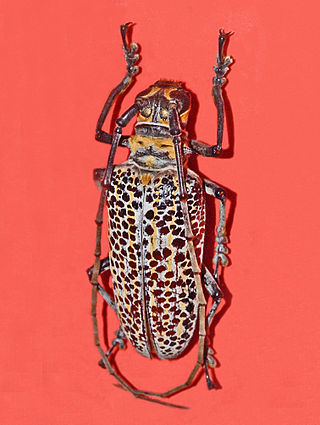
Rosenbergia is a genus of longhorn beetles in the subfamily Lamiinae, close to the genus Batocera.

Cyclommatus is a genus of the family Lucanidae, also known as the stag beetle. The majority of the species from the genus Cyclommatus are located in Southeast Asia, though some species are found in China and Taiwan as well. The genus Cyclommatus also consists of three subgenera: Cyclommatus, Cyclommatinus and Cyclommatellus. Each subgenera contains 80, 24 and 3 species respectively. In total, the genus Cyclommatus consists of a total of 134 species, though more are still being discovered to this day.

Pseudochalcothea auripes is a beetle of the family Scarabaeidae and subfamily Cetoniinae.
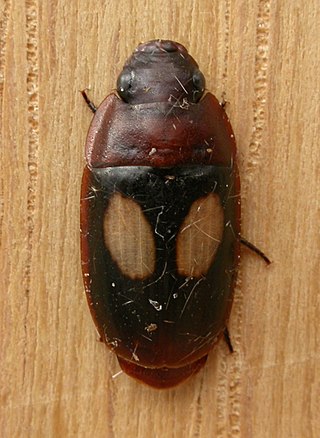
Pseudomorphinae is a subfamily of ground beetles in the family Carabidae. There are about 12 genera and at least 360 described species in Pseudomorphinae.

The beaver beetle is an ectoparasitic beetle that is only found on its host species, beavers, and the sole member of the genus Platypsyllus. It is flattened and eyeless, resembling a flea or tick. It used to be placed in a separate family called Leptinidae, but is now placed in the family Leiodidae, in the subfamily Platypsyllinae.

Pachyteria is a genus of round-necked longhorn beetles of the subfamily Cerambycinae and tribe Callichromatini.

Cerosterna is a genus of flat-faced longhorns beetle belonging to the family Cerambycidae, subfamily Lamiinae. The members are found in the Indomalayan realm. The name is commonly misspelled as Celosterna, an unjustified emendation of the original spelling, not valid under the ICZN.

Thermonotus is a genus of longhorn beetles of the subfamily Lamiinae, containing the following species:
Grammoechus is a genus of longhorn beetles of the subfamily Lamiinae, containing the following species:
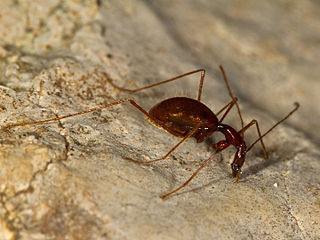
Cholevinae is a subfamily of small carrion beetles in the family Leiodidae. There are more than 260 genera and 1,100 described species in Cholevinae.
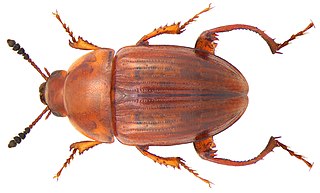
Leiodinae is a subfamily of round fungus beetles in the family Leiodidae. There are more than 60 genera and 1,800 described species in Leiodinae.
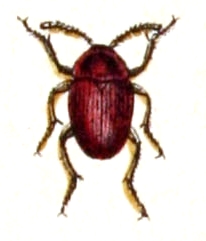
Catops is a genus of small carrion beetles in the family Leiodidae. There are about 16 described species in Catops.

Leptinus is a genus of mammal-nest beetles in the family Leiodidae, sometimes referred to as "mouse nest beetles". There are at least 3 described species in Leptinus.
Leptinillus is a genus of mammal-nest beetles in the family Leiodidae. There are at least 2 described species in Leptinillus.

Leiodes is a genus of round fungus beetles in the family Leiodidae. There are at least 110 described species in Leiodes.
















